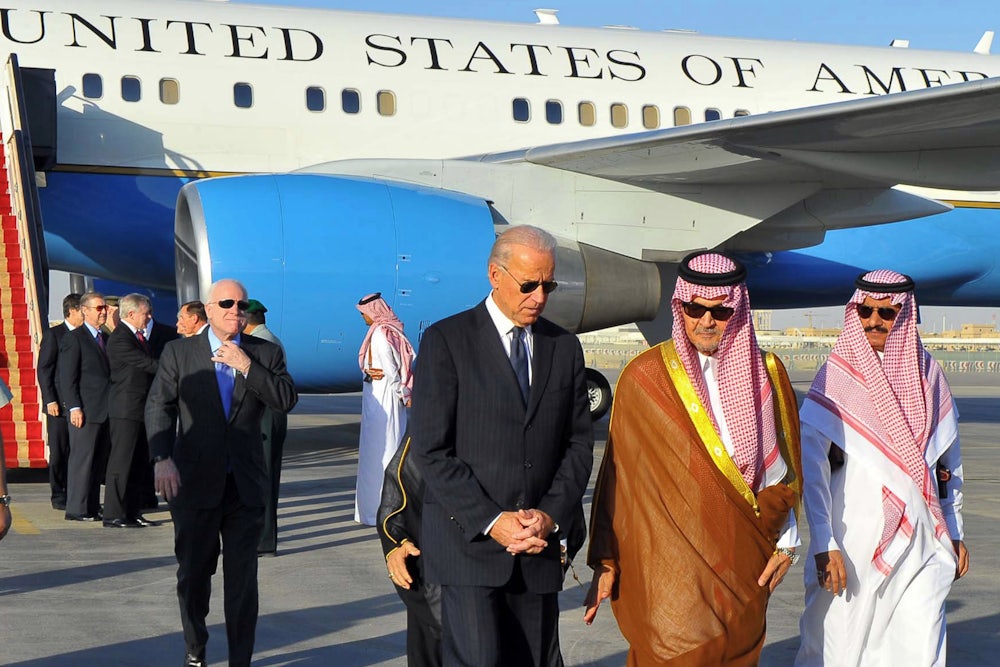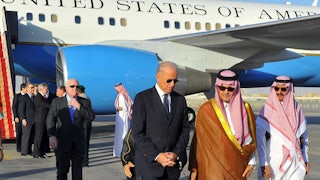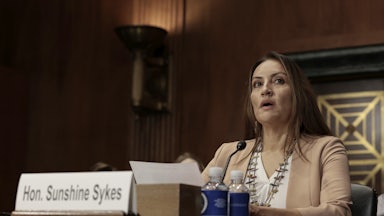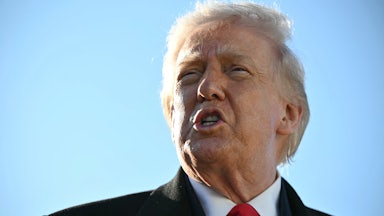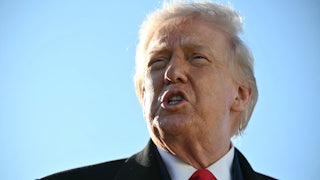Back in 2020, when Joe Biden was running for president, he spared little venom for Saudi Arabia and its leader, Mohammed bin Salman, who was responsible for the murder and dismemberment of Jamal Khashoggi, a Washington Post columnist and legal resident of the United States.
The Saudis would “pay the price,” pledged Biden, and be turned into “the pariah that they are.” In the “present government in Saudi Arabia,” said Biden, there is “very little social redeeming value.” A Biden administration would reverse the Trump White House’s flattering of MBS and refusal to hold him accountable for the murder of Khashoggi.
But in a grand American tradition of saying one thing on the campaign trail about foreign policy and then doing another as president, Biden has reversed course. Next month, he will fly to Riyadh and shake the hand of the man who almost certainly ordered Khashoggi’s murder.
When Jimmy Carter ran for president, he vowed to make human rights the centerpiece of American foreign policy. Imagine his surprise when, as president, he ended up in Tehran toasting the Shah of Iran. Bill Clinton blasted the “butchers of Beijing” and George H.W. Bush’s appeasement of the leaders responsible for the Tiananmen Square massacre. Then after taking office, he eventually extended China “Most Favored Nation” trading status.
The rhetoric of the campaign trail is no match for the reality of geopolitics—but also for the inclination of most presidents simply to take the path of least resistance in the Middle East.
Biden’s move on Saudi Arabia has been telegraphed for some time. Early in his term, he released a U.S. intelligence report detailing MBS’s involvement in Khashoggi’s murder. At the time, Biden imposed limited sanctions against the regime but spared MBS.
Back in October, Biden was prepared to meet with the Saudi leader at a G20 meeting, but MBS failed to attend.
Next month, he will fully rehabilitate him.
The reason for Biden’s about face is largely a product of petroleum politics. Biden is buffeted by inflation concerns at home, and he needs Saudi Arabia to increase oil production in order to push gas prices lower.
With gas now creeping closer to $5 a gallon—a record high and one that will likely come back to hurt Democrats in midterm elections this fall—the urgency of Biden’s entreaties is clear. While OPEC announced that it will increase oil production later this summer, Saudi officials have resisted doing more—blaming the surge in pricing on other factors than just OPEC supply. As a Saudi official said at Davos in May, “The kingdom has done what it can.”
Biden clearly hopes that ushering the Saudis back into the proverbial family of nations will loosen the spigots. But even if that happens, with oil markets tighter because of the Ukraine war and, in particular, sanctions on Russian gas exports, it’s doubtful that it will make much of a difference for American consumers.
Over the past several weeks, Biden released millions of barrels from the Strategic Petroleum Reserve to little effect. Republicans have clamored for Biden to open up federal lands for more drilling and ease restrictions on pipeline construction. None of that is going to have an immediate impact on oil prices, especially between now and Election Day.
Indeed, even after the White House announced Biden’s trip, energy traders still sent the prices of U.S. and global oil benchmarks higher. One Hill staffer I spoke to described the trip as an elaborate “rain dance” that is unlikely to bring a positive outcome in the form of lower gas prices for American consumers.
Biden clearly hopes that simply trying to cajole the Saudis into increasing production will influence voters at home—though this seems like yet another dubious assumption.
The president’s agenda in Riyadh also runs deeper than just oil. According to a recent column by The Washington Post’s David Ignatius, a major impetus for the trip is “Israel’s strong desire that Biden normalize relations with MBS and the kingdom as part of a broad realignment” in the region.
Relations between the two longtime enemies have significantly improved, with word this week from The Wall Street Journal that “Saudi Arabia is engaging in serious talks with Israel to build business ties and create new security arrangements as the conservative Islamic kingdom senses a shift among its public in favor of establishing official ties with the majority Jewish state.” While in Saudi Arabia, Biden is expected to announce a Saudi agreement to allow overflights from Israeli planes.
In addition, with the recent signing of a ceasefire in the civil war in Yemen (in which the Saudis have long played a destructive role), the United States may want to reward the Saudis for finally winding down a conflict that has taken countless lives.
But the larger reality of the situation is that the United States still needs Saudi Arabia. As one observer of the region said to me, “If you assume that this is going to be a long conflict with Russia, then you can’t afford to alienate the global south—and a country that controls a vital commodity.”
Moreover, MBS is “going to be king for the next several decades.” The U.S. needs to have a relationship with him.
But as is often the case in America’s relationship with its partners, U.S. leaders tend to forget who is in charge. Yes, the U.S. needs Riyadh, but the Saudis are far more reliant on Washington. It was a point highlighted in 2020 when President Trump threatened to cut off military support for the Saudi regime if it didn’t agree to cut oil production in order to protect U.S. oil producers at the outset of the pandemic. It was a rare moment of candor in a relationship that was largely defined by Trump’s solicitousness of MBS and the Saudi regime. While it’s unlikely Biden would make a threat as rash and impulsive as Trump’s, it doesn’t appear that the administration has made a significant effort to wring concessions out of MBS before agreeing to Biden’s trip.
But for Biden and countless U.S. presidents, placating authoritarian regimes in the Middle East is simply the easier path. Biden, who came to office pledging to restore human rights and support for democracy at the forefront of American foreign policy, has for the most part gone all in with America’s Middle East partners. On the Arab-Israeli conflict, Biden has shown little interest in getting involved—and has had little to say about Israel’s actions in the occupied territories (though this may be a function of not wanting to do anything that risks bringing Benjamin Netanyahu back into power).
On Iran’s nuclear program, Biden reversed his campaign trail pledge to bring the U.S. back into the deal on “day one” of his presidency and has, by and large, adopted the hostile position of Israel, Saudi Arabia, and the Gulf States toward Iran.
At the outset of Biden’s tenure in office, there was hope that he might be willing to challenge some of the country’s most debilitating foreign policy orthodoxies. The willingness to throw political caution to the wind and pull U.S. troops out of Afghanistan was a positive harbinger. But since then, Biden has followed the same predictable course: bolster sclerotic regimes, fail to challenge the status quo, and keep the U.S. deeply involved in a region where it has fewer and fewer national security interests.
Now the U.S. is allowing the region’s worst regime, Saudi Arabia, back into America’s good graces. Make no mistake: Biden going to Riyadh is a major win for MBS. In a tête-a-tête between the two leaders, MBS is the one who refused to blink. What’s far less clear is what the U.S. is getting in return for Biden’s decision to break bread with a man who has the blood of Jamal Khashoggi on his hands.
